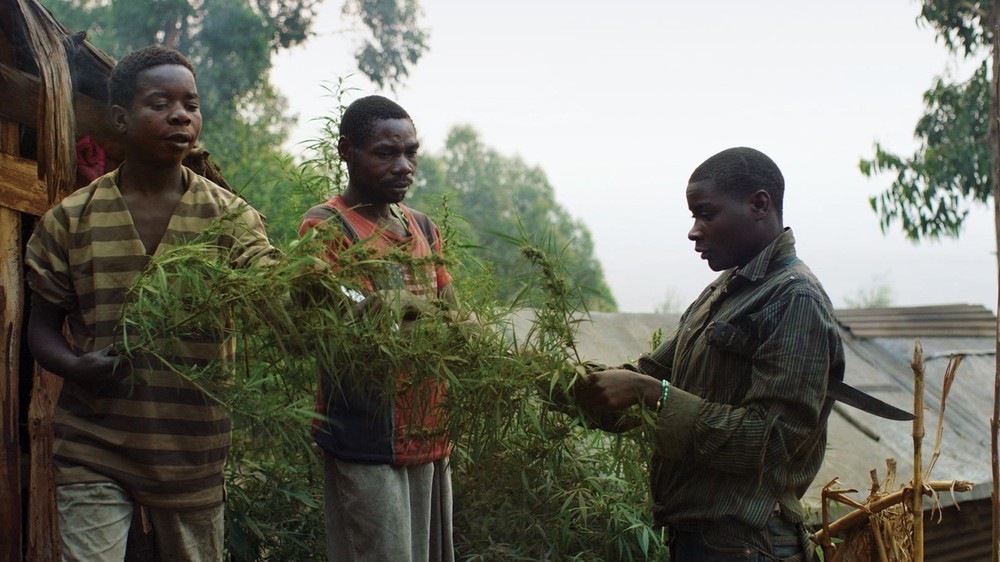
Three men on a farm in the Democratic Republic of Congo prepare weed for sale.
From April 19 to 21, the United Nations General Assembly will convene a special session to discuss international drug control priorities and policies. So, on 4/20, while stoners across the globe light up and dream of legal weed, the suited emissaries of the world's governments will hold their own kind of chief sesh, inside the wood-paneled chamber of the UN's Manhattan headquarters.
Their expected agenda could be the beginning of the end for de facto pot prohibition around the world, and it could bring a subsequent reorganization of the macroeconomics of marijuana—a welcome change that would have wide-reaching effects.
While some states in the US and countries such as Uruguay have legalized and regulated marijuana, they do so in violation of three governing international agreements about drug control. The first, the Single Convention on Narcotic Drugs, was signed in 1961, and today, its signees total 185 member nations.
The treaty requires each country's laws to sanction "the production, manufacture, export, import, distribution of, trade in, use, and possession" of cannabis, poppy, and coca plant "exclusively to medical and scientific purposes." Marijuana has been used traditionally in cultures around the world, but this dictum has led to many countries outlawing it.
It's unlikely that the outcome of the special session will be worldwide marijuana legalization. But according to William R. Brownfield, the assistant secretary of the Bureau of International Narcotics and Law Enforcement Affairs for the United States, and the top State Department official guiding US policy in the lead up to the 4/20 meeting, the new thinking in international drug policy is "harm reduction," not "eradication."
As he said at a press conference on March 8, "At the end of the day, the issue is not precisely whether a government has chosen to decriminalize or not to decriminalize; it is whether the government is still working cooperatively to reduce the harm caused by the product." At the international level, that subtle distinction radically reframes drug policy, and it might give governments cover to reconsider their policies.
It's probably premature to imagine a legitimate, worldwide supply chain of weed, given that this UN meeting is really just a baby step in that direction, but what would a world with legal weed look like?
Pretty bad for pot farmers, it turns out. Mark Kleiman, a drug policy expert at New York University, told me as much one afternoon last June.
"Think about a joint. It's a little bit of dried plant material in a little bit of a wrapping. That sounds a lot like a tea bag. What does a tea bag cost in a supermarket? Two cents? That's the production cost of a joint, not four dollars, which is roughly the [market value of] cannabis content of a contemporary joint. So we could be looking at a two-order magnitude change in the price of weed."
While criminal organizations profit the most off of that artificially pumped-up cost, for farmers from California's Emerald Triangle to peasant growers in the Democratic Republic of Congo (DRC), the price change will drastically alter their ways of life. Any worldwide normalization of weed commodity prices could, potentially, have a very negative impact on growers.
The FDLR care little about the weed trade
happening under their noses—gold and rare earth minerals are their pay
dirt. But to the farmers I met there, pot is a cash crop.
When I visited last July, I tracked Congo's weed supply chain to a tiny village in the Masisi territory in the eastern part of the country. The village, Kivuye, was under control of the Democratic Forces for the Liberation of Rwanda (FDLR), a notorious rebel group started by the Hutu militants who carried out the genocide in neighboring Rwanda. The FDLR care little about the weed trade happening under their noses—gold and rare earth minerals are their pay dirt. But to the farmers I met there, pot is a cash crop.
I asked Mwembo, a farmer, why he and others in Kivuye grow the stuff. "Because it enables us to buy essential commodities like salt or soap," he told me. "As you can see, I was able to wash this jacket I am wearing because they bought my weed. When my child needs clothes, I can raise money to buy them. That's why we do this."
While many think of legal weed as an unmitigated good, and while it has improved economies in several situations, legalization and regulation could present hardship for some. I hope that farmers like Mwembo will still be able to provide for their families if the UN moves toward international decriminalization of weed and the bottom falls out of the illicit market.

No comments:
Post a Comment